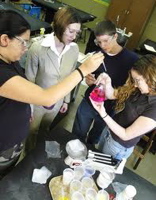UTeach Initiative Starts at UALR
Educators in several UALR colleges are working together to recruit more science, technology, engineering, and mathematics (STEM) undergraduate students into teacher prep programs with the goal of adding teachers in these critical areas at public schools. This UALR initiative got a boost last week when the Governor’s Workforce Group selected the university to receive $216,000 to support participation in the national UTeach program. Other universities in the state selected for the program were the University of Arkansas at Fayetteville and the University of Central Arkansas.
Dr. Michael Gealt, dean of the College of Science and Mathematics, and Dr. Angela Sewall, dean of the College of Education, worked with several UALR faculty in their respective colleges to write a grant proposal to the UTeach Institute to support the UALRTeach initiative on campus.
The collaboration answers Gov. Mike Beebe’s call to increase the number of secondary school science and mathematics teachers by recruiting more STEM undergraduate students into public schools.
The ultimate goal of UALR’s collaboration is to model itself after the UTeach program, which began at the University of Texas in Austin and has been replicated at universities in Pennsylvania, Ohio, Tennessee, Georgia, and more.
“It’s a great program,” said Gealt, whose alma mater – Temple University – implemented the program in 2008 with 20 students. “That number has grown to 145 this year. Our goal at UALR is to increase our science and mathematics education graduates from three per year to 30 per year.”
A major thrust of UTeach is to recruit college students majoring in science, technology, engineering, and math to become teachers in those areas. The UTeach program provides an initial course to participants at no charge. In the program, UALR will hire Master Teachers with K-12 teaching experience to mentor students in the program.
“Experience at other universities indicates that students interested in teaching science and mathematics increased tenfold with this program, that 90 percent of the graduates are still teaching a year later, and that 80 percent are still teaching after five years,” Sewall said.
Last August, Beebe announced a $2.68 million initiative involving several programs:
This UALR initiative got a boost last week when the Governor’s Workforce Group selected the university to receive $216,000 to support participation in the national UTeach program. Other universities in the state selected for the program were the University of Arkansas at Fayetteville and the University of Central Arkansas.
Dr. Michael Gealt, dean of the College of Science and Mathematics, and Dr. Angela Sewall, dean of the College of Education, worked with several UALR faculty in their respective colleges to write a grant proposal to the UTeach Institute to support the UALRTeach initiative on campus.
The collaboration answers Gov. Mike Beebe’s call to increase the number of secondary school science and mathematics teachers by recruiting more STEM undergraduate students into public schools.
The ultimate goal of UALR’s collaboration is to model itself after the UTeach program, which began at the University of Texas in Austin and has been replicated at universities in Pennsylvania, Ohio, Tennessee, Georgia, and more.
“It’s a great program,” said Gealt, whose alma mater – Temple University – implemented the program in 2008 with 20 students. “That number has grown to 145 this year. Our goal at UALR is to increase our science and mathematics education graduates from three per year to 30 per year.”
A major thrust of UTeach is to recruit college students majoring in science, technology, engineering, and math to become teachers in those areas. The UTeach program provides an initial course to participants at no charge. In the program, UALR will hire Master Teachers with K-12 teaching experience to mentor students in the program.
“Experience at other universities indicates that students interested in teaching science and mathematics increased tenfold with this program, that 90 percent of the graduates are still teaching a year later, and that 80 percent are still teaching after five years,” Sewall said.
Last August, Beebe announced a $2.68 million initiative involving several programs:
- UTeach, a program to recruit college students majoring in science, technology, engineering, and math to become teachers in those areas.
- New Tech High Schools, where students are taught practical applications for their class programs.
- EASTcore, a program to expose students to Project-Based Instruction in STEM disciplines.
View more stories in News
